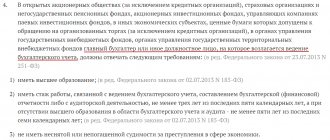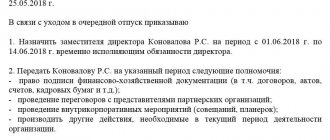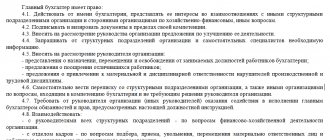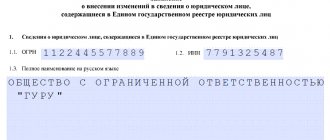Many managers of small firms independently control their business. However, in the case of large organizations where there is a high load on the company administration, there is a need to attract a deputy. The person holding this position assumes part of the responsibilities of the general director . In this article, we propose to talk about what the job description of a deputy general director includes.
The position of deputy can appear in any company, regardless of its size and industry affiliation
Job description of the Deputy General Director: meaning and procedure for development
The instructions are developed by an employee of the HR department after signing the employment contract as an annex to it or a separate document.
It is an important legal act that reflects the position of the employee in the organizational structure, his rights and responsibilities. The information base for drawing up instructions is the Qualification Directory of Positions. The instructions usually contain:
- list of requirements for professional training (qualification requirements);
- employee functions, job responsibilities;
- knowledge and methods that the specialist will rely on in his work.
Contents of the instructions
The job description of the Deputy General Director includes the rights and working conditions. Some documents contain sections: “Must know”, “General”, “Final provisions” and others.
The following requirements for a manager’s qualifications are universally accepted: higher education, work experience, experience in a managerial position.
The first section (“General Provisions”) characterizes the specialist’s place in the company structure. The deputy reports directly to the general director and is appointed and removed by him as necessary.
General provisions
Who does the deputy report to?
Deputies' subordination is, as a rule, direct, that is, they report directly to the first person in the organization. However, it is permissible to make an announcement in the instructions that, for example, the first deputy is directly subordinate to the head of the organization or directly to the decisions of the owners of the company. In the job description of the deputy for general issues, you can indicate that he reports not only to the head of the organization, but also to his first deputy.
Who reports to the deputy
If the staffing level of the enterprise is significant and the number of deputies is more than two, it is advisable to assign in writing to each of them certain divisions that they will supervise, and the leadership of which will be linked directly to each of them. The first deputy, as a rule, oversees departments related to the main and direct activities of the company, for example, production, energy and technical control departments. The address of the Deputy for Economic Affairs is the planning, sales and accounting departments. The area of responsibility of the deputy for general issues includes the economic department, personnel and office.
Procedure for appointment and dismissal from position
Depending on the established procedure in the organization, the instructions in this section indicate that a person is appointed and dismissed from his position by order of the head of the company. It may be stated that people are appointed to the positions of the CEO (as the names of these positions are sometimes abbreviated) in accordance with the charter of the organization, the decision of the owners of the company, and are subject to dismissal in the same manner.
Who performs duties during the period of temporary absence
This section of the general part of the instructions provides for the procedure for temporary replacement in the event of the absence of a deputy director. Most often, as the job description states, the deputy general director can be replaced by the head of one of the departments he supervises. This allows you to plan work more efficiently, since you don’t have to think every time who can perform the duties of an absent employee. It can be written more simply that the temporary acting position will be a specialist appointed by a separate order of the General Director.
Qualification requirements
If the position does not imply the presence of any benefits or restrictions that are provided for by current legislation, the developer of the instructions can independently come up with what kind of education and work experience the employee should have. You can use qualification directories for management positions as a hint. If a position involves benefits and restrictions or is included in the list of professional standards, it will be sufficient to indicate that the person appointed to this position must meet these qualification requirements. Information about wages (in rubles or foreign currency) is not indicated in the job description.
What you should know, be able to do and what to be guided by
This section is of no practical value, but is traditionally indicated in all job descriptions. It is enough to mention in general terms that the employee must know the legislation (depending on the area of activity), be able to apply it in practice, and that he is guided by the charter of the company, as well as the regulations of the general director.
Job responsibilities
The responsibilities of the Deputy General Director include knowledge of the laws of the Russian Federation and regulations of the enterprise. In addition, knowledge of civil, labor, financial, tax and other fundamentals of legislation.
| The manager in this position will have to study | The main functions include |
|
|
|
|
|
|
|
|
Complex responsibilities
- Improve the company’s economic performance and create indicators with improved standards, monitor the performance of all functions by responsible employees. It is necessary to gradually strengthen and, if possible, expand the enterprise, the scope of its activities, and strengthen regulatory and financial discipline. This is provided for by the job responsibilities of the deputy director for educational work.
- Prevent and promptly eliminate the accumulation of a large amount of material assets, as well as excessive consumption of materials or damage to equipment due to improper operation or too intensive operation. This is part of the job responsibilities of the school's deputy principal.
The role of the deputy as a leader
The first deputy general director becomes a connecting element between the institutional manager and the rest of the workforce, which leaves an imprint on all his activities. He is obliged not only to inform employees of all orders and instructions from senior management, but also to ensure their implementation. For the director, his deputy is a feedback source to employees, informing them about problematic situations in the work of the company and the measures taken to solve them.
In addition to obligations, the following rights must be provided:
- act as the face of the organization during negotiations within the scope of competence;
- report violations to the CEO and suggest ways to neutralize them;
- demand from the entire management staff of the enterprise compliance with organizational and technological rules, request from departments the documentation and data required to fulfill their job duties;
- dispose and give instructions to subordinates in accordance with their powers, determine their functions and official responsibilities, participate in the development of orders, instructions, contracts and other documents.
Liability arises in case of negligence in one’s functions, violation of orders, approved instructions and rules.
Rights
The rights of the Deputy General Director include the following:
- Make orders, give advice to employees about their work activities or when problems arise.
- Take part in the preparation of projects, orders and instructions. For example, he can analyze the actions taken, participate in the preparation of estimates and contracts.
- Represent the interests of the company. For this purpose, interact with government agencies and make decisions within the framework of your concept, with different organizations when resolving urgent issues, and have the right to sign.
- The deputy general director must also respond to requests from different departments of the enterprise and be able to replace the responsibilities of any employees.
- Inform the manager about shortcomings in the company that were identified by him personally or according to information from other employees. Make proposals to improve the functioning of the company and modernize departments.
Functionality of the Deputy for Economic Affairs
The Deputy General Director for Economics is one of the key figures in the corporation. Its main tasks are planning, organizing and controlling the economic activities of the company. They depend on the strategy and degree of development of the enterprise.
A large-scale organization with a large turnover and prospects cannot do without managers in such an area as finance. As a rule, the deputy coordinates the work of the economic department and accounting department, and in some cases the work of other departments.
A high-quality job description promotes an adequate and detailed understanding of one’s functions. She helps to select a truly suitable specialist for this responsible position.
Additional Responsibilities
Sometimes the CEO is not present, and he may also be absent for a long time. Then his main responsibilities are transferred to the deputy. This employee must conduct successful and rational negotiations with customers and partners, organize various meetings, and conduct events, the main goal of which is to modernize production and expand the company’s activities. This includes the job responsibilities of the Deputy Director for Internal Affairs.
Employees of the enterprise are directly subordinate to the deputy director, so he must not only supervise their work, but also take all necessary actions to facilitate it, safety and effectiveness. This employee develops, improves and implements the rules and regulations of labor discipline, ensures proper provision and guarantee of compliance with basic regulations on labor protection and fire safety. This includes the job responsibilities of the Deputy Director for Production.
This employee conveys to employees the requirements and orders of the General Director, monitors and, if necessary, ensures their implementation. He regularly informs the general director of the company about any malfunctions or deviations in work that could lead to significant economic or material damage, and, if necessary, carries out his instructions and decrees intended to eliminate and correct any inconveniences in the system.
Contents of the job description of the Deputy for Economic Affairs
| The work of a manager in the field of economics requires knowledge | The direct responsibilities of the Director of Economics include: |
|
|
|
|
|
|
|
|
| |
| |
|
Introduction
It is the manager who decides when exactly to appoint a deputy - he can introduce the position in parallel with the signing of documents on taking up the position, in the process of work, or create it as a reserve parachute if he wants to leave (the deputy is appointed as an assistant, gets involved in all matters and after the dismissal of the general, takes his place) . The position itself can also have different names: vice president, deputy, executive director.
What exactly are the responsibilities of this person? It all depends on the specifics of the enterprise, the decision of the manager or founders.
Example:
The general director and founder of Dal LLC deals exclusively with production issues at the enterprise. The company is successfully growing and developing, and it needs strong legal and economic support. The general director introduces the position of deputy for economic and legal issues, relieving himself of all responsibilities in these areas, exercising only general control over the state of affairs.
At the same time, the deputy has the right to build the entire chain necessary for him to work effectively with the permission of the head of the company: create a legal and economic department, hire specialists, regulate their activities, etc. Often the general director decides to develop strategic plans, search for new directions, capture new markets or define promising paths, freeing yourself from routine and routine. In this case, he can also hire an assistant, transferring all the main tasks to him and limiting himself to only general supervision and consulting of a specialist.
Who should be selected for the position of Deputy General Director? There is no definite answer - it all depends on the specifics of the company’s work and on what exactly is required of him . But in general, we can identify a generalized portrait of a person for this position based on requests and vacancies:
- A man aged from 27 to 33 years.
- Higher technical or economic education.
- Experience in the field in question for at least 1 year.
- Adequacy, the ability to organize a work process, monitor the execution of one’s orders.
- Independence, leadership skills, responsibility.
Many managers prefer to hire technicians because they have well-structured knowledge, they know how to build effective management schemes and approach the process from a practical perspective. Deputies with two degrees are popular: technical and legal.
Qualification requirements for a deputy in economics
Qualification requirements for managers in large world-famous companies include knowledge of international financial reporting standards, English, additional education, such as an MBA degree, CFA, CPA certificates.
Economics and finance specialists in different companies never solve the same problems. Their functions are varied: from routine financial management to attracting investments and issuing securities.
To successfully fulfill official obligations, the Deputy Director for Economics is required to have managerial and leadership qualities and communication skills. You must have the ability to influence and persuade, successfully interact with partners, make management decisions, and work in a team.
Deputy Director for Strategic Development
The Deputy General Director for Development is engaged in planning the corporation's activities for the future. Formulating the enterprise's mission, goals and objectives, and defining successful policies is the prerogative of the strategic manager. All this determines the presence of certain qualification requirements: higher education (economics, law) and management experience, preferably as a strategic manager.
A development specialist must know management theory, marketing, economics, strategic, financial and innovation management.
JOB DESCRIPTION
Deputy General Director for General Affairs
1. General Provisions
1.1. This job description defines the functional, job responsibilities, rights and responsibilities of the Deputy General Director for General Issues of the Structural Technologies division (hereinafter referred to as the Deputy General Director for General Issues) of the Association of Administrative and Economic Professionals (hereinafter referred to as the Institution).
1.2. A person who meets the following education and training requirements is appointed to the position of Deputy General Director for General Affairs:
- Additional professional education - advanced training programs in the field of activity (at least once every three years);
- Higher education (non-core) - specialty or master's degree and additional professional education - professional retraining programs in the field of activity;
- Higher education - specialty or master's degree;
with practical work experience:
- At least five years in the field of administrative, economic, documentation or organizational support;
1.3. The Deputy General Director for General Affairs should know:
- The concept of the market segment in which the organization operates;
- Advanced foreign experience in administrative, economic, documentation and organizational support;
- Basics of business planning;
- Social policy of the organization;
- Fundamentals of psychology, business communication;
- Rules of business correspondence;
- Business plan of the organization;
- Organization structure;
- Basic principles of computer science, building information systems and features of working with them;
- Structure and principles of organizing organizational support;
- Structure and principles of organizing economic support;
- Fundamentals of organization management;
- Methodology for implementing local regulations;
- Organization development strategy;
- Methodology for developing local regulations;
- Structure and principles of organizing documentation support;
- Methods for assessing personnel and labor results;
- Methods for constructing business plans;
- Fundamentals of risk management;
- Business process control methods;
- Rules of business etiquette;
- Fundamentals of conflictology;
- Fundamentals of project and change management;
- The organization's personnel management policy;
- Fundamentals of personnel management and motivation;
- Advanced domestic experience in administrative, economic, documentation and organizational support;
- Methods of business process analysis;
- Legislation of the Russian Federation and the legal framework governing activities in the field of administrative, economic, documentation and organizational support;
- Structure and principles of organizing administrative support;
- Methods of information processing using software and computer tools;
- Rules of business correspondence;
- Methodology for implementing local regulations;
- Business process control methods;
- Methods of information processing using software and computer tools;
- Structure and principles of organizing economic support;
- Structure and principles of organizing administrative support;
- Methodological documents on financial analysis;
- Legislation of the Russian Federation and the legal framework governing activities in the field of administrative, economic, documentation and organizational support;
- Business plan of the organization;
- Fundamentals of project and change management;
- Structure and principles of organizing documentation support;
- Fundamentals of organization management;
- Advanced foreign experience in administrative, economic, documentation and organizational support;
- The concept of the market segment in which the organization operates;
- Methods of business process analysis;
- Structure and principles of organizing organizational support;
- Methods for constructing business plans;
- Methodology for developing local regulations;
- Basics of business planning;
- Methodological documents on budgeting and cash flow management;
- Rules of business etiquette;
- Basic principles of computer science, building information systems and features of working with them;
- Advanced domestic experience in administrative, economic, documentation and organizational support;
- Fundamentals of risk management;
- Organization structure;
- Organization development strategy;
- Fundamentals of financial management;
- Structure and principles of organizing economic support;
- Business process control methods;
- Advanced foreign experience in administrative, economic, documentation and organizational support;
- Structure and principles of organizing organizational support;
- Fundamentals of risk management;
- Rules of business correspondence;
- Basics of business planning;
- Legislation of the Russian Federation and the legal framework governing activities in the field of administrative, economic, documentation and organizational support;
- Structure and principles of organizing documentation support;
- Fundamentals of project and change management;
- Rules of business etiquette;
- The concept of the market segment in which the organization operates;
- Fundamentals of psychology, business communication;
- Structure and principles of organizing administrative support;
- Fundamentals of conflictology;
- Organization structure;
- Methods for constructing business plans;
- Organization development strategy;
- Methods of business process analysis;
- Fundamentals of organization management;
- Basic principles of computer science, building information systems and features of working with them;
- Advanced domestic experience in administrative, economic, documentation and organizational support;
- Business plan of the organization;
- Methods of information processing using software and computer tools;
- Methodology for implementing local regulations;
- Methodology for developing local regulations;
- Fundamentals of conflictology;
- Business plan of the organization;
- Legislation of the Russian Federation and the legal framework governing activities in the field of administrative, economic, documentation and organizational support;
- The concept of the market segment in which the organization operates;
- Rules of business etiquette;
- Organization development strategy;
- Methods of business process analysis;
- Methodology for developing local regulations;
- Fundamentals of project and change management;
- Fundamentals of organization management;
- Advanced foreign experience in administrative, economic, documentation and organizational support;
- Organization structure;
- Structure and principles of organizing documentation support;
- Rules of business correspondence;
- Methodology for implementing local regulations;
- Methods of information processing using software and computer tools;
- Advanced domestic experience in administrative, economic, documentation and organizational support;
- Structure and principles of organizing administrative support;
- Business process control methods;
- Structure and principles of organizing economic support;
- Fundamentals of risk management;
- Fundamentals of psychology, business communication;
- Structure and principles of organizing organizational support;
- Basic principles of computer science, building information systems and features of working with them;
1.4. The Deputy General Director for General Affairs must be able to:
- Identify and assess risks, including risks from abuse, and determine procedures aimed at minimizing these risks;
- Use methods for introducing corporate norms and rules for managing administrative, economic, documentation and organizational support of the organization;
- Work with a large amount of information;
- Develop approaches, including non-standard ones, to performing work tasks through the use of special knowledge and expert sources of information;
- Find solutions in non-standard situations or in cases of unexpected changes in the project implementation plan;
- Conduct negotiations and business correspondence, observing the norms of business etiquette;
- Manage staff motivation, engagement and discipline;
- Monitor and organize management processes of administrative, economic, documentation and organizational support;
- Analyze and determine the efficiency of support units based on consolidated accounting and reporting documents;
- Build business processes, carry out business planning;
- Use means of communication;
- Coordinate interaction and communications between department employees, as well as with representatives of the organization’s external environment;
- Evaluate your activities in terms of the effectiveness of its final results;
- Apply skills to overcome employee resistance to implementing changes;
- Develop and implement local regulations and regulatory documents;
- Use computer programs for record keeping, systematization and analysis of data, compilation of databases, document management, reference and legal systems, resources of the Internet information and telecommunications network, office equipment;
- Organize and consolidate business processes, performers and employees in order to achieve one result;
- Distribute between employees powers, duties and responsibilities for performing relevant tasks, and verify their implementation;
- Summarize and systematize incoming information, based on it, find the most effective solutions to achieve the assigned tasks;
- Determine performance indicators of department personnel;
- Monitor and organize management processes of administrative, economic, documentation and organizational support;
- Use methods for analyzing the main factors that determine the need for changes in the management strategy of administrative, economic, documentation and organizational support;
- Develop and implement local regulations and regulatory documents;
- Analyze and determine the efficiency of support units based on consolidated accounting and reporting documents;
- Summarize and systematize incoming information, based on it, find the most effective solutions to achieve the assigned tasks;
- Check the quality of information received in the process of budgeting the unit’s activities;
- Develop approaches, including non-standard ones, to performing work tasks through the use of special knowledge and expert sources of information;
- Use methods of financial calculations and analysis;
- Plan and develop budgets;
- Plan the use of financial resources in the short and long term;
- Distribute between employees powers, duties and responsibilities for performing relevant tasks, and verify their implementation;
- Use methods for introducing corporate norms and rules for managing administrative, economic, documentation and organizational support of the organization;
- Develop new solutions for the implementation of projects and business processes in the event of their change or changes in the financial needs for their implementation within the approved budget;
- Find solutions in non-standard situations or in cases of unexpected changes in the project implementation plan;
- Determine ways to achieve goals and implement assigned tasks in the short and long term of the organization’s development;
- Evaluate your activities in terms of the effectiveness of its final results;
- Identify and assess risks, including risks from abuse, and determine procedures aimed at minimizing these risks;
- Build business processes, carry out business planning;
- Use computer programs for record keeping, systematization and analysis of data, compilation of databases, document management, reference and legal systems, resources of the Internet information and telecommunications network, office equipment;
- Work with a large amount of information;
- Organize and consolidate business processes, performers and employees in order to achieve one result;
- Use means of communication;
- Use methods for introducing corporate norms and rules for managing administrative, economic, documentation and organizational support of the organization;
- Use means of communication;
- Organize and consolidate business processes, performers and employees in order to achieve one result;
- Find solutions in non-standard situations or in cases of unexpected changes in the project implementation plan;
- Use methods for analyzing the main factors that determine the need for changes in the management strategy of administrative, economic, documentation and organizational support;
- Work with a large amount of information;
- Build business processes, carry out business planning;
- Summarize and systematize incoming information, based on it, find the most effective solutions to achieve the assigned tasks;
- Determine and implement ways to achieve goals and implement assigned tasks in the short and long term of the organization’s development;
- Evaluate your activities in terms of the effectiveness of its final results;
- Identify and assess risks, including risks from abuse, and determine procedures aimed at minimizing these risks;
- Conduct negotiations and business correspondence, observing the norms of business etiquette;
- Develop and implement local regulations and regulatory documents;
- Distribute between employees powers, duties and responsibilities for performing relevant tasks, and verify their implementation;
- Apply skills to overcome employee resistance to implementing changes;
- Develop approaches, including non-standard ones, to performing work tasks through the use of special knowledge and expert sources of information;
- Monitor and organize management processes of administrative, economic, documentation and organizational support;
- Analyze and determine the efficiency of support units based on consolidated accounting and reporting documents;
- Use computer programs for record keeping, systematization and analysis of data, compilation of databases, document management, reference and legal systems, resources of the Internet information and telecommunications network, office equipment;
- Analyze and determine the efficiency of support units based on consolidated accounting and reporting documents;
- Summarize and systematize incoming information, based on it, find the most effective solutions to achieve the assigned tasks;
- Work with a large amount of information;
- Organize and consolidate business processes, performers and employees in order to achieve one result;
- Use computer programs for record keeping, systematization and analysis of data, compilation of databases, document management, reference and legal systems, resources of the Internet information and telecommunications network, office equipment;
- Build business processes;
- Conduct negotiations and business correspondence, observing the norms of business etiquette;
- Use means of communication;
- Develop and implement local regulations and regulatory documents;
- Find solutions in non-standard situations or in cases of unexpected changes in the project implementation plan;
- Evaluate your activities in terms of the effectiveness of its final results;
- Develop approaches, including non-standard ones, to performing work tasks through the use of special knowledge and expert sources of information;
- Identify and assess risks, including risks from abuse, and determine procedures aimed at minimizing these risks;
- Distribute between employees powers, duties and responsibilities for performing relevant tasks, and verify their implementation;
- Use methods for introducing corporate norms and rules for managing administrative, economic, documentation and organizational support of the organization;
- Apply skills to overcome employee resistance to implementing changes;
- Monitor and organize management processes of administrative, economic, documentation and organizational support;
1.5. The Deputy General Director for General Affairs is appointed and dismissed by order of the President of the professional community of the Institution in accordance with the current legislation of the Russian Federation.
1.6. The Deputy General Director for General Affairs reports to the President of the professional community of the Institution and the head of the Structural Technologies division
2. Labor functions
- 2.1. Personnel management of structural units providing administrative, economic, documentation and organizational support.
- 2.2. Financial analysis, budgeting and cash flow management for administrative, economic, documentation and organizational activities.
- 2.3. Definition and implementation of strategic development of administrative, economic, documentation and organizational support.
- 2.4. Management of administrative, economic, documentation and organizational support of the organization.
3. Job responsibilities
- 3.1. Determination of criteria for assessing the performance of employees of departments providing administrative, economic, documentation and organizational support.
- 3.2. Determination of criteria for personnel selection and admission to administrative, economic, documentation and organizational support units.
- 3.3. Initiating events to develop staff and improve their professional level.
- 3.4. Assessing the level of professional knowledge and skills of support department employees.
- 3.5. Monitoring and evaluating the effectiveness of the activities of employees of departments providing administrative, economic, documentation and organizational support.
- 3.6. Definition of standards and procedures for personnel management of support units.
- 3.7. Formation and construction of the structure of divisions.
- 3.8. Organization of control over the implementation by staff of decisions made.
- 3.9. Development of strategy and tactics in the field of financial policy of an economic entity.
- 3.10. Bringing the approved budget to the direct implementers.
- 3.11. Formation of a budget for administrative, economic, documentation and organizational support.
- 3.12. Analysis and assessment of financial risks within the framework of fulfilling the assigned tasks and activities of the organization.
- 3.13. Assessing the compliance of the financial goals of the divisions with the current financial state of the organization.
- 3.14. Making changes to financial plans.
- 3.15. Participation in the budget campaign, development of operating and capital expenditure plans.
- 3.16. Management of cash flows for administrative, economic, documentation and organizational support within the approved budget.
- 3.17. Setting financial goals for departments.
- 3.18. Monitoring the execution of the budget for administrative, economic, documentation and organizational activities.
- 3.19. Development and adoption of management decisions to improve the quality of service and increase the efficiency of administrative, economic, documentation and organizational support.
- 3.20. Assessment of potential risks.
- 3.21. Defining the mission and goals of administrative, economic, documentation and organizational support.
- 3.22. Monitoring the organization's business processes.
- 3.23. Introduction of innovative technologies and solutions into business processes of administrative, economic, documentation and organizational support.
- 3.24. Preparation of proposals for improving and increasing the efficiency of administrative, economic, documentation and organizational business processes.
- 3.25. Setting strategic goals for administrative, economic, documentation and organizational support units in accordance with the mission and strategic development plans of the organization.
- 3.26. Assessing the effectiveness of introducing innovative technologies and solutions into business processes of administrative, economic, documentation and organizational support.
- 3.27. Conducting meetings and negotiations with major suppliers and interested parties.
- 3.28. Determination of methods for controlling business processes.
- 3.29. Assessing the efficiency of financial and economic activities and identifying reserves for its improvement.
- 3.30. Risk assessment as part of the implementation of operational activities of administrative, economic, documentation and organizational support units.
- 3.31. Determination and implementation of administrative, economic, documentation and organizational policies of the organization.
- 3.32. Making and organizing the implementation of management decisions aimed at reducing the likelihood of an unfavorable result within the framework of implementing the operational activities of administrative, economic, documentation and organizational support units.
- 3.33. Setting operational goals and objectives for the organization's support units.
Change job functions
4. Rights
The Deputy General Director for General Issues has the right:
4.1. Request and receive the necessary information, as well as materials and documents related to the activities of the Deputy General Director for General Issues.
4.2. Improve your qualifications, undergo retraining (retraining).
4.3. Enter into relationships with divisions of third-party institutions and organizations to resolve issues within the competence of the Deputy General Director for General Issues.
4.4. Take part in the discussion of issues included in his functional responsibilities.
4.5. Make suggestions and comments on how to improve activities in the assigned area of work.
4.6. Contact the relevant local government bodies or the court to resolve disputes arising during the performance of functional duties.
4.7. Use information materials and regulatory documents necessary to perform your job duties.
4.8. Pass certification in the prescribed manner.
5. Responsibility
The Deputy General Director for General Affairs is responsible for:
5.1. Failure to perform (improper performance) of one’s functional duties.
5.2. Failure to comply with orders and instructions of the president of the professional community of the Institution.
5.3. Inaccurate information about the status of fulfillment of assigned tasks and instructions, violation of deadlines for their execution.
5.4. Violation of internal labor regulations, fire safety and safety rules established in the Institution.
5.5. Causing material damage within the limits established by the current legislation of the Russian Federation.
5.6. Disclosure of information that has become known in connection with the performance of official duties.
For the above violations, the Deputy General Director for General Affairs may be subject to disciplinary, material, administrative, civil and criminal liability in accordance with current legislation, depending on the severity of the offense.
This job description has been developed in accordance with the provisions (requirements) of the Labor Code of the Russian Federation dated December 30, 2001 No. 197 FZ (Labor Code of the Russian Federation) (with amendments and additions), the professional standard “Specialist of administrative and economic activities” approved by order of the Ministry of Labor and Social protection of the Russian Federation dated February 2, 2021 No. 49n and other legal acts governing labor relations.
Share the job description on social networks:
Contents of the job description of the deputy for strategic development
His main job functions include:
- planning the organization's development policy, monitoring production processes, analyzing indicators;
- development and implementation of new development projects (business lines, entry into new markets, modernization), preparation of documentation related to the implementation of new programs;
- appointment of those responsible for the implementation of development plans, organization and control of joint work of departments on projects.
Developing anti-crisis measures and adjusting plans in non-standard situations is also the responsibility of the development deputy. The development manager has the right to use and request any information about the work of the company from department heads. He formulates proposals to optimize work processes and issues orders related to the implementation of strategic plans.
The presence of a deputy director for strategic management and development and economics is the prerogative of large developing companies that set high goals and objectives.
One of the leading and significant positions in the organization is occupied by the Deputy General Director. The instructions are intended to become a reliable support for him in his work, regardless of the scope of his functional responsibilities.
Job responsibilities
The most important section of the instructions, because this is the employee’s job function. The job responsibilities of any deputy follow from:
- the need to resolve the range of issues delegated to him by the General Director;
- specifics of the activities of the units he supervises.
In addition, the position of deputy director is vested with organizational and administrative functions, and the employee’s labor function in this section focuses on the coordination and management of subordinate employees. If job responsibilities are being developed, it is recommended to use mostly verbs:
- organizes;
- coordinates;
- manages;
- controls;
- provides;
- takes action, etc.
For example, the first deputy director is obliged to:
- coordinate the work of all departments in accordance with the goals and objectives that the enterprise faces;
- take measures to ensure uninterrupted operation of production;
- inform, and not hide from the general director, all shortcomings in the operation of production and its supply, take measures to eliminate the causes and conditions that may contribute to the downtime of the enterprise, etc.
In general, filling this section with specifics directly depends on the specifics of the company’s activities: if the main direction is production, then the section of responsibilities of the first deputy director of the organization will primarily consist of responsibilities for managing and ensuring the technical and production activities of the enterprise.








